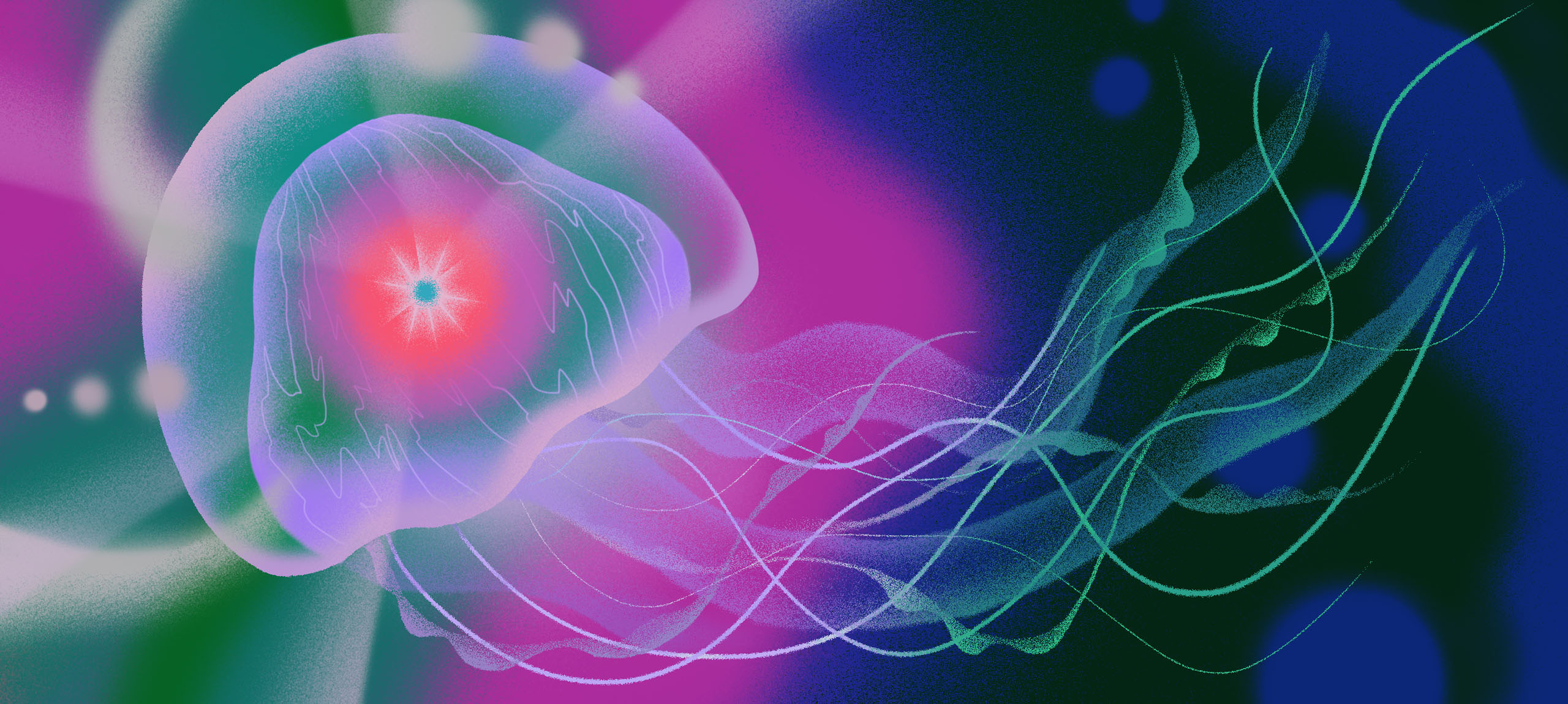Lessons From an Immortal Jellyfish
Do you really want to live forever?

The human yearning for immortality is a cosmic aspiration—a defiance of the natural order of things so out of earthly reach that we attribute it to the realms of gods and mythology. Our fascination with eternal life can be dated back to the earliest surviving work of literature, The Epic of Gilgamesh, which told of an immortality-granting plant at the bottom of the ocean. Some of the oldest Hindu texts speak of a death-defying drink called amrita—also taken from the ocean. In Norse mythology, the gods of Asgard are kept immortal by eating golden apples. The fountain of youth, the elixir of life; stories and symbols of never-ending life recur across time and culture.
But civilizations’ most scientific pursuit for immortality begins, curiously, with a little jellyfish—scarcely the size of a human’s pinky fingernail—discovered in the 1880s off the coast of Italy. The immortal nature of the hydrozoan, or Turritopsis dohrnii, wasn’t realized until about 100 years later, however, when a marine biology student noticed something odd about the creature: it wouldn’t die.
The immortal jellyfish, as it came to be popularly called, was able to shift its cellular structure to revert to a polyp—an earlier stage of its development—whenever it was injured. By alternating between polyp and medusa—its fully grown stage—this tiny jellyfish managed to sidestep death and achieve what so many centuries of human culture have romanticized: immortality.
What does the existence of an immortal jellyfish mean for human perpetuity? As of right now, not much. There is still a great deal of research to be done on exactly how this jellyfish evades death, and only one person in the world studies them full time: Shin Kubota, a Japanese scientist and professor, who cares for his collection of immortal jellyfish as if they’re his microscopic babies. But while the possibility of immortality is left undecided, the philosophical question—eloquently summed up by ’80s synth-pop band Alphaville in the hit single “Forever Young”—remains: Do you really want to live forever?
On surface levels, we are all aware of our imminent death. This is what separates us from animals and defines us as humans—the greatest existentialist burden we bear. Seeking immortality feels in a way like a back road to avoid the reckoning we face with our own expiration. Yet, if we did have infinite time, would we really do anything with it? Impermanence fosters a sense of urgency, a will to live while we still can. It often feels as though complacency settles in the monotony of time.
We don’t like to think too deeply about death, and perhaps this is why the concept of immortality is so alluring and problematic: it is the fear of death, not the urge to live, that makes us want to live forever. French Renaissance thinker Michel de Montaigne argued that the art of living stems from the understanding of death. To Montaigne, death was not to be feared but faced head on, contemplated, and ultimately, accepted. Of death, he wrote: “Let us disarm him of his novelty and strangeness, let us converse and be familiar with him, and have nothing so frequent in our thoughts as death.” In a sense, he’s sharing a philosophy of marrow-sucking, moment-seizing vigour when it comes to living one’s life, a sentiment gift wrapped in familiar platitudes: carpe diem, memento mori, you only live once.
Yet, perhaps by their overuse, these phrases tend to glide off our consciousness; we can all say that we are aware of our mortality, but is every single action we take in pursuit of making the most of what we have? We shouldn’t shy away from talking about death, but we simply could not function if we were always hyperaware of our own demise; we’d either be paralyzed by anxiety or so reckless in our behaviour that we would live in constant chaos.
What, then, defines a well-lived life? In Ernest Becker’s Pulitzer Prize–winning book The Denial of Death, the anthropologist writes, quoting Goethe, that the secret is in balance: “We must plunge into experience and then reflect on the meaning of it. All reflection and no plunging drives us mad; all plunging and no reflection and we are brutes.” So, while we wait for the answers for eternal life from a mysterious little jellyfish, we can instead reflect on how to live with the time we do have. 




